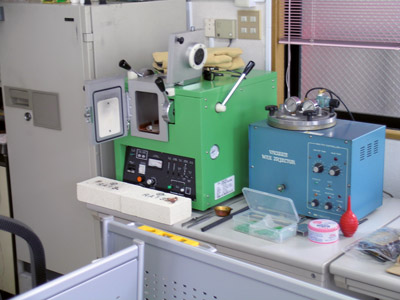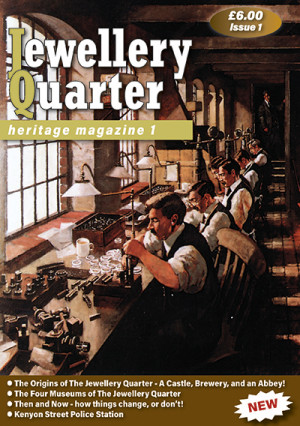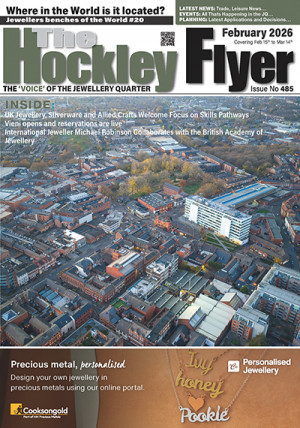Chris Hewitt of Hewitt Jewellery Equipment Ltd., had the opportunity last year to visit Japan at the invitation of Yoshida Cast, a leading Japanese manufacturer of casting machines, who they now represent in the U.K.
The visit was an eye opener and may be a pointer to how jewellery manufacturing may develop in the U.K in the coming years.
Japan has suffered along with many other high cost countries from cheap imports coming into their market from China, India and elsewhere in the far east.
They have adapted by targeting the very high end of their market with the very best quality jewellery, supplying all alloys from gold, silver, platinum, palladium and titanium, even stainless steel on fast-turn delivery times.
Most of the companies are small, and they occupy very small premises as land is very expensive in Japan. (Approximately only 10% of the Japan islands are inhabited by 120 million people due to the mountain like terrain).
Chris tells The Hockley Flyer:
 “Visiting a small selection of these companies, I could see that they had packed into a very small area, very small and flexible casting equipment capable of producing very high quality castings. Naturally, I was looking at factories with Yoshida machinery, but it explained why they had developed such good equipment for their domestic market.”
“Visiting a small selection of these companies, I could see that they had packed into a very small area, very small and flexible casting equipment capable of producing very high quality castings. Naturally, I was looking at factories with Yoshida machinery, but it explained why they had developed such good equipment for their domestic market.”
“One casting machine, called the Gapman, (70 grams capacity of pt) is a tabletop machine, and it was developed by Yoshida specifically for this market. It can cast platinum, palladium alloys, stainless steel as well as gold and silver all on the same machine, with just a change of crucible and melting temperature. I know of no other vacuum or pressure casting machine which can do this to the high level of quality required by the Japanese jewellery market.”
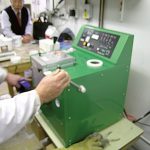
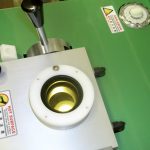 “At the beginning of this year, we took the Gapman casting machine for trials at a leading platinum manufacturer in the UK, and proved the resultant casting quality was excellent, and as good as we saw in Japan.”
“At the beginning of this year, we took the Gapman casting machine for trials at a leading platinum manufacturer in the UK, and proved the resultant casting quality was excellent, and as good as we saw in Japan.”
“This manufacturer now has the first Yoshida casting machine, (a larger model), in the UK. The technology behind this machine is very clever, as you would expect from a Japanese machine.
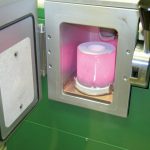
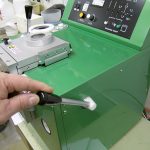 They have taken proven pressure and vacuum casting technologies, and added, 1) a de-gassing melting operation, this removes any gas from the platinum metal thereby eliminating gas porosity, before the final melting and pouring of the metal, and 2) a revolving platform for the flask to sit on which allows the flask to revolve at low speed while molten metal is poured into the flask under pressure, resulting in a very fast metal flow which helps to prevent any shrinkage porosity from the cast piece.”
They have taken proven pressure and vacuum casting technologies, and added, 1) a de-gassing melting operation, this removes any gas from the platinum metal thereby eliminating gas porosity, before the final melting and pouring of the metal, and 2) a revolving platform for the flask to sit on which allows the flask to revolve at low speed while molten metal is poured into the flask under pressure, resulting in a very fast metal flow which helps to prevent any shrinkage porosity from the cast piece.”
“The whole casting process has been very carefully calibrated, so that the process can be repeated time and again. The Yoshida sprue design also is very clever, in that it considerably reduces the amount of metal waste from each casting.
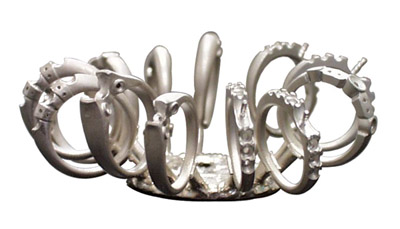 Typically you would expect less than 50% of a cast tree using a spin casting machine for example to be product, but with their unique design, Yoshida’s cast tree will yield more than 65% using the Gapman machine, and more like 80% from their larger casting machines. These figures represent big cost savings to manufacturers.”
Typically you would expect less than 50% of a cast tree using a spin casting machine for example to be product, but with their unique design, Yoshida’s cast tree will yield more than 65% using the Gapman machine, and more like 80% from their larger casting machines. These figures represent big cost savings to manufacturers.”
“These machines are very easy to use for casting, platinum, palladium, stainless steel and also for gold and silver. Yoshida have a further range of casting machines for Titanium casting.”
Hewitt Jewellery Equipment Ltd can supply all the casting shop equipment required, including a special small Vacuvest vacuum mixer, designed for mixing the 2 part chemical investments used in platinum and palladium casting.
The complete Gapman casting shop takes up little space and is ideal for anyone thinking of small scale casting from a variety of alloys, may be from CAD generated designs where prototyping machines are used to create models, or one off pieces. Training is also provided by Hewitts for the complete casting process.
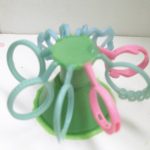 The larger Yoshida machines, with their greater capacity (200 to 350 grams per cycle) are ideal replacements or additions to existing spin casting operations, allowing customers to cast more difficult and varied jewellery designs, with a much reduced the risk of gas or shrinkage porosity with the result of improved quality with much less waste and cost.
The larger Yoshida machines, with their greater capacity (200 to 350 grams per cycle) are ideal replacements or additions to existing spin casting operations, allowing customers to cast more difficult and varied jewellery designs, with a much reduced the risk of gas or shrinkage porosity with the result of improved quality with much less waste and cost.
Hewitts would be happy to talk to anyone interested in these new technologies. There is more detail shown on their web site www.hewitt-impex.co.uk


